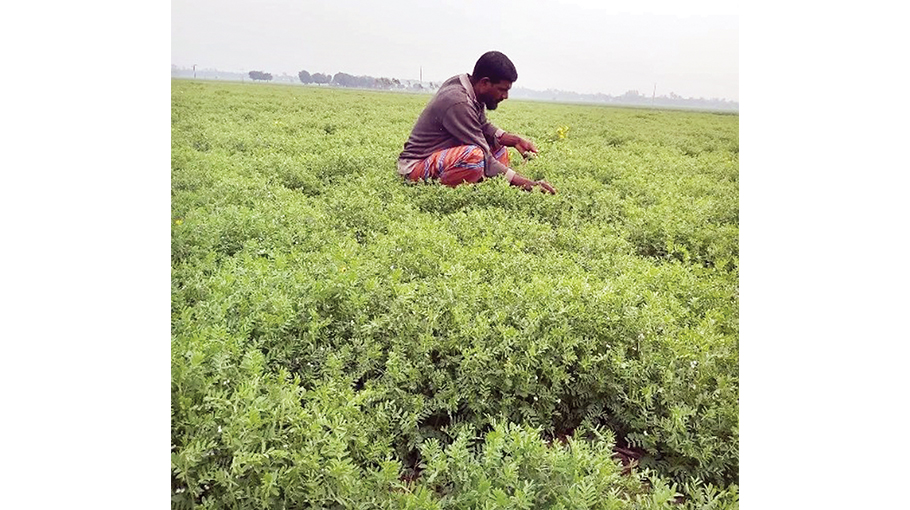Dense fog harming Robi crops, Boro seedlings

The persisting cold wave coupled with dense fog sweeping across the country for the last couple of days are badly affecting Robi crops and damaging seedlings of Boro paddy.
The foggy weather is severely hampering the growth of various Robi crops including mustard, lentils, potato, tomato, wheat, pulse, onion and garlic.
In some districts, Boro seedlings are turning yellow and subsequently getting damaged due to dense fog.
Mustard, lentils and vegetables are usually attacked by fungus, while tomato and potato by late blight diseases due to severe cold. Cold wave and dense fog also causes fall of betel leaf and damage to mango flowers.
Md. Belal Hossain, a professor at Department of Plant Pathology of Sher-e-Bangla Agricultural University, said various kinds of vegetables including potato, tomato and brinjal can get damaged due to severe winter and fog.
If the cold wave with thick fog continues for several more days, Robi crops and Boro seedlings will seriously be affected. Seedlings often die due to severe cold. So, the seedlings should be covered with polythene at night, he suggested.
Saiful Alam, an additional director of the Department of Agricultural Extension (DAE), said that if the severity of winter lasts for several more days, seasonal crops will have great risk of being damaged.
In view of the situation, the DAE has given necessary instructions its field-level officials to provide all-out support to the farmers.
Boro farmers in some districts are worried as they see their seedlings getting discoloured. It is high time to take care of seed-beds for Boro cultivation.
Like some other districts, Boro farmers of Rajshahi are worried about their seedlings as the bitter chill and foggy weather are damaging their seedlings at the seed beds in various upazilas of the district.
According to the sources of the Rajshahi DAE, a total of 65,600 hectares of land has been brought under Boro cultivation in the district. A target has been set to produce seedlings on 3,400 hectares. However, the seedbeds have been made on 4,582 hectares of land.
A delayed winter this season has helped smooth growth of Boro seedlings during mid-December but dense fog and severe cold are affecting seedbeds. If seedlings are damaged, it will create an adverse impact on Boro production.
Braja Hari Das, a former deputy director at the Bangladesh Meteorological Department (BDM) in Rajshahi, said if the adverse weather and fog linger, the seedlings will be damaged.
However, farmers are weeding, spraying water and pesticides in their seedbeds and many farmers are covering their seedbeds with polythene sheets from the afternoon to the late morning.
Belel Hossain, a farmer of Koi Danga village under Charghat upazila in Rajshahi, has sowed Boro seeds on four bighas of land. He has a plan to transplant Boro seedlings on three bighas of land and sell the excess seedlings in the market.
The farmer said that there was no substantial damage to the Boro seedlings as the seedbeds are made on elevated land but the seedbeds are facing scarcity of water. He is irrigating the seedbeds daily resulting in an additional cost for the production of the seedlings.
Lutfun Naher, Upazila Agriculture Officer of Charghat, said that some seedbeds of Boro paddy might be damaged due to severe cold and fog but the seedbeds on the elevated grounds are unlikely to be damaged. The farmers are advised about the ways of saving their seedbeds during such adverse weather. There is no reason to damage the seedlings on the beds if those are taken care of properly, she added.
The cold spell and the dense fog are also affecting Boro seedlings and other winter crops in seedbeds in Barishal, Bhola, Nilphamari, Jamalpur and some other districts.
Alongside the farmers, DAE officials are also worried as the Robi crops may be damaged due to such unfavorable weather.
The DAE officials said that various kinds of vegetables including potato, pulse, maize and oilseed, are cultivated in January. The growth of the Robi crops is hampered and damaged by fungus and blight diseases due to such weather. The vegetables, onions, pulses and other crops are also being damaged and attacked by insects.
This time is also for preparing the seedbeds for Boro and Irri cultivation. The Boro seedbeds are more damaged in winter and heavy fog because the ‘fusarium pathogen’ present in the soil in the cold and if it is attacked immediately after sprouting, the seeds will not germinate.
It is reported from Joypurhat, Jamalpur and some other districts that mustard flowers are falling. The potato and some other vegetables are being damaged in Gaibandha and some other districts.
Farmers said that the attack of diseases and pests on the crops has increased in the time. This can severely disrupt potato production. Farmers will suffer if infection is not prevented. The worried farmers are trying hard to protect therr Robi crop.
A farmer of Sadullahpur upazila in Gaibandha district said that he cultivated potato in 50 decimals of land this year with hope of more profit. There was a chance of a bumper crop but the potatoes are being rotted as the fields were attacked by insects due to the heavy fog of the last few days.
Ruhul Amin, assistant agriculture officer of Sadullapur Upazila, said that they are trying to provide support to the farmers so that their crops are not damaged.
Like Gaibandha, Robi crops are being destroyed in Kushtia. Upazila Agriculture Officer of Kushtia’s Daulatpur Siddikur Rahman said that any farmer can take advice from us if they want. Apart from this we are distributing advisory leaflets among the farmers.
Alongside the Robi crops, the seedbed of Boro paddy is also getting destroyed in Kurigram. Deputy Director of Kurigram DAE Biplab Kumar Mohant said that there are seedbeds on six and a half thousand hectares of land in the district. Dense fog and severe cold are delaying Boro cultivation.





